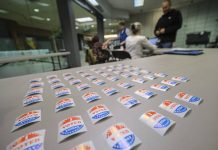
Mike Wolanin | The Republic Students arrive for the first day of school at Northside Middle School in Columbus, Ind., Thursday, Aug. 4, 2022.
A local parent and unsuccessful school board candidate has compiled a catalog of books that he says are present in Bartholomew Consolidated School Corp. libraries that he thinks “may be problematic.”
Eric Grow, who ran for the school board’s District 4 seat but lost to Dale Nowlin, shared a Google Docs link to a spreadsheet on the “Grow Strong Schools” Facebook page, which previously served as a social media profile for his school board campaign.
Grow described the list as a project “aimed at improving the resources available in our public school libraries.”
“Unfortunately, some of the books available in BCSC libraries are a cause for concern and highlight the need for improvement in the review process for library materials,” he said. “This is a pressing issue that deserves the attention of our community, and I hope we bring it to the forefront of public discussion.”
He said the list is intended to be an “informative resource” so that people can come to their own conclusions. He hopes that it leads to more engagement between the school corporation and the public on the subject of library materials.
BCSC officials issued a statement saying they have a specific policy in place for public complaints and concerns. If a person chooses to go through this process due to concerns with a book, the school corporation will “thoroughly review the book as necessary and make a determination regarding the book’s placement.”
“The time, energy, and effort of BCSC faculty and staff, and, thus, taxpayer money, will continue to be spent on the provision of access to opportunity and achievement for all students,” the BCSC statement says. “We will maintain our focus on the very important work of addressing the mental health challenges of our students, lessening substance misuse, changing disruptive behavior, improving academic performance and advancing graduation rates.”
Grow’s list includes a number of reasons for why a book might raise concerns, listing content such as violence, drug use, profanity, derogatory terms, “controversial cultural, political, social, or racial commentary,” “controversial/inflammatory religious commentary,” “alternate gender, sexual ideologies, dismorphic” and a number of other tags relating to sexual content. Grow also flagged books for containing ideologies such as social-emotional Learning, critical race theory and diversity, equity and inclusion.
As of Feb. 10, the main list contained around 500 titles, and includes “To Kill a Mockingbird” and graphic novel adaptations of Anne Frank’s diary and “Brave New World.” The list specifies if the books are present in BCSC libraries, and, if so, which ones. There’s also additional options marked “catalogued with no copies avail” or “not catalogued.”
The spreadsheet also includes a list of an additional 400 books that may be problematic but have not yet been fully tagged and a list of almost 300 links to various articles and websites on the subjects such as specific books, conflicts involving library materials, curriculum, “grooming” young readers and LGBT content.
The list details books present in school libraries that “may be problematic,” Grow wrote. However, he added some of the books on the list might be appropriate and others may “contain controversial topics that are not suitable for the age group they are available to.” He also wrote that some books have not been fully reviewed yet and that the list could contain errors.
He cited the “Mary in the Library – Michigan” Facebook group, booklooks.org and ratedbooks.org as sources he used to create his list.
When asked if he was aiming to get certain books removed or banned from school libraries, Grow said, “I’ve kind of drawn myself back, I guess. I’m aiming at getting our school leadership to engage in the conversation, to engage the concerns I’ve been raising around the content in the libraries. So I don’t have such a specific goal, kind of like what you’re alluding to, because I know I don’t have all the answers, and we live in a world where everyone has different opinions.”
He would like people with different opinions to “come to the table” and have the debate in order to reach the best solution. He suggested that one possibility might be to have a rating system for books, with parents able to set restrictions on which levels their children can access.
When asked whose responsibility it is to determine what’s appropriate for school libraries, Grow replied that it ultimately falls to parents.
“We are a community, so everybody holds responsibility on the topic, from librarians to school leadership to parents,” he said. “I think that we all hold responsibility, but I think ultimately the parents should be informed and be able to have input on that decision.”
Grow has repeatedly expressed concerns about inappropriate materials in school libraries during the time for public comment at school board meetings. He emphasized his point by reading aloud from a sexually explicit passage he attributed to “A Court of Silver Flames” during one meeting in the spring of 2022.
“I hope that by drawing attention to this issue, our public school leadership will, finally, take action to ensure that all materials in our libraries are suitable for our children,” he wrote about the book list.
The issue of inappropriate materials versus concerns about censorship was one of the topics debated during BCSC’s 2022 school board elections. At one candidate forum in October, Jason Major responded to a question about censorship by reading an explicit passage from a book that he said is included in Columbus East High School’s library and later identified as “People Kill People.”
“Is this acceptable in our schools?” he asked afterward.
During election season, Major, Grow, Logan Schulz and Roy West called themselves “Dads 4 Change” and banded together based on similar views, but only Major and Schulz were elected to the board.
Major said that when he looked over the main list, it was his understanding that not all of these titles are present in BCSC libraries based on Grow’s filing system.
Like Grow, he expressed a desire for a “one stop shop” for parents to learn about what content is present in a book, similar to how some use the Internet Movie Database to examine which movies are appropriate for their children.
“So I think the gap between what Eric has provided and where I think most people want to have better understanding is, what are the specifics behind why is book bad?” said Major. “A book may be on his list because it’s got language in it. I would challenge that on an average day, a 15-year-old’s kid’s probably used some of the language that’s in that book with their everyday conversations with their buddies.”
Schulz said that while he may or may not agree with the inclusion of certain books on Grow’s list, he agrees that there can be cause for concern when certain books are available to younger age groups.
As an example, he mentioned “A Child Called It,” which is on the list and is a book he believes to be of literary value. However, Schulz said that he wouldn’t want his elementary-age daughters reading it.
“I would like to be able to talk when their brain is at the age of developmental appropriateness to have those discussions,” he said.
Major expressed similar concerns, saying that if books with information about abuse are available to younger students who don’t understand the concept, it could lead to a child casually discussing the topic around a classmate who, unbeknownst to them, has experienced this form of trauma.
Schulz said that the fact that certain books are available in some elementary libraries and not others seems inconsistent and points to a “lack of process.” He expressed a desire for a common standard.
When asked if he would plan to bring the matter of library materials before the school board, Schulz replied that he would like to address it in the same way as curriculum.
“Understand where is that appropriate guideline, where is that appropriate line of maturity and able to digest the information, I think, and also getting parental input and getting community stakeholder input,” he said. “I think we want to be sure everybody’s able to get access to those (books) that interest them, but we want to make sure that it’s actually of interest and of educational value, too. So it’s something I definitely want to bring.”
Additionally, given the input he’s received from parents, he expects the topic of curriculum and literature to come up at meetings of the board’s public engagement subcommittee, where he is a member.
Major said that the school corporation should review its processes to ensure that librarians have “strong rules” to work with when it comes to choosing the right materials to have in stock.
“There should be policies in place in BCSC that help the librarians to ensure that they are purchasing good books that would lead to less questions, less challenges from parents,” he said.
When in comes to determining what’s appropriate for school libraries, Major described it as a three-legged stool made up of librarians as gatekeepers, school board and administration setting proper policies for them to follow, and everyone following the laws put in place by the state.
In regards to whose responsibility it is to determine what’s appropriate for school libraries, Schulz said, “I think that rests on the librarians, who are the experts in this matter. At the same time, I want to understand — whenever you put a person in charge, right, there’s obviously opportunity for misunderstandings or changing of levels. And the problem with literature is there’s no common rating.”
He said that there needs to be a process of “checks and balances” if there are concerns regarding a certain book.
When asked about Grow’s idea for a rating system, Schulz replied that he believes it’s the only way to address the issue without “creating a technological hurdle,” as he doesn’t believe there’s currently a way to see what his children check out. He added that he would rather there be a common rating system created by the state, country or a group of school districts rather than one set up by an individual district, which creates bias.
He also said that he planned to look into the sources Grow used to create his list to learn more about their motivations.
Major also expressed support for the idea of a rating system, though he noted that it would require collaboration, possibly through parents of differing perspectives coming together to reach a mutual agreement.
He added that there probably won’t be one solution that fixes everything and also suggested having parental permission slips for certain books.




